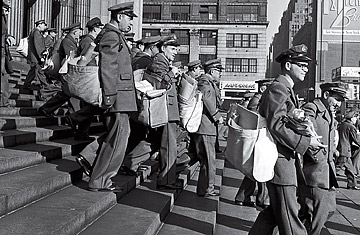Through Rain or Snow or Gloom of Night
The Postal Service is under fire this holiday season, partly due to political meddling, which has screwed up established systems. As one who was once a minor part of that system, we sympathize with the little people who from the earliest days of this country have kept us in touch with each other, reliable couriers making their swift appointed rounds through rain or snow or gloom of night. It isn't their fault that Christmas cards are not moving at the usual speed. We have noted that first class local delivery, which used to be overnight, has been taking two days, and we understand out-of-town mail is even more delayed.
It makes us nostalgic for the 1950s, when almost every late teenage kid we knew counted on temporary post office work during the Christmas rush to give us the cash for family presents. We understand that temps are still used, although we haven't seen any personally. But there sure were a lot of us in those days.

We worked the last year or so of high school and through our first years of college, and by the time we were finished, we had perfected the art of gaming the system. Our first year, probably senior year of high school, we just delivered mail. We clocked on in the morning when it was still gloom of night. The sorters had worked through the night, packing bags of mail in such a way that it was organized top to bottom in the order of the homes' addresses. We were leaving with a full bag just as dawn broke.
The bags were often heavy, but we were young healthy guys. We took a trolley car to the neighborhood our route served. It happened to be near our house. It took a few hours for the first delivery, and there was no need to return to the station because a second delivery was made to a mail box, already bagged. We usually went home to wait for it, sometimes catching an hour or two of sleep. Arrival time of the afternoon shipment varied, but we were usually working again by early afternoon and finished in a few hours.
We quickly learned the tricks of our beat, such as avoiding nasty dogs. You just left the mail outside a guard fence in boxes provided by the owners. Apartments were easy because you served a half dozen families at a single stop. You quickly got to know some recipients' names. In a few cases, you delivered Christmas cards you had sent yourself. People we met on the route were almost always pleasant. They considered our work important. And we felt the same way.
By late afternoon, we returned to the post office and clocked off, ending what was about a 10-hour day. That was the first year or two. But by then, we discovered that it was possible to join the night shift, sorting the mail that arrived around the clock from the main post office in center city. The main Philadelphia post office was located practically on top of Pennsylvania Railroad tracks where cars of mail from all over arrived by rail. There it was sorted by postal zones and quickly trucked to neighborhood stations. The U.S. Postal Service was a well-functioning machine.
Sorting began in the late afternoon and went on through much of the night as trucks arrived with fresh deliveries. You got a bundle of mail earmarked for the same neighborhood and put it in slots for each address. When you had it all sorted, it was wrapped in small bundles tied up by a machine. It was fun to work.
On the night shift you got to know other temporary workers. Some had been doing it for years and were friendly with the full-time workers. They were often teachers or coaches who, like the students, had free time over the holidays. They were all pleasant fellows to spend time sorting mail with.
Working both day and night shifts permitted you to be on the clock most of the day. That was why the hours spent between day deliveries became necessary nap time. There were pauses, often brief, between clocking off and then back on. It depended on the supervisor and how strict he was. It became an understandable goal to be on the clock for a full 24 hours.
We never quite made it. Our post office had a basement where night workers often went to rest between truck deliveries. The place was pitch black, and it was easy to fall asleep there. We tried to stay on the clock during those lulls, but the supervisor used to barge in and tell everybody to get off the clock. On one occasion, we had been on the clock almost 23 hours and, hiding in the basement, thought we would finally reach the 24-hour goal. But the super came in, woke everybody up and told us to get off the clock. We did, but not more than 45 minutes later he was back and telling to get up to work.
So, postal workers, from a former colleague, we appreciate your dedication during this time of politically-inspired duress. Keep up your Yuletide morale. And stay on the clock.
